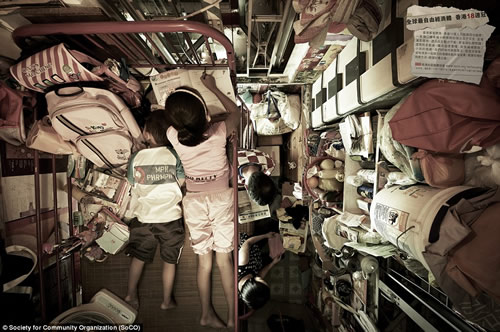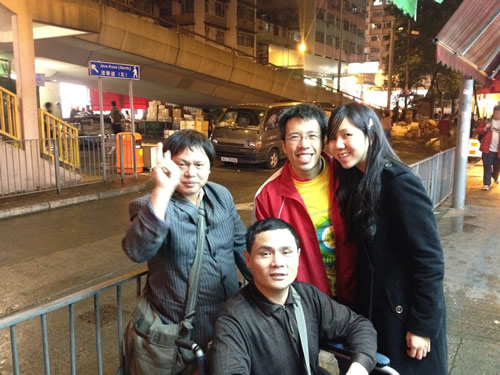Recently, I come across an article on how the poor in Hong Kong live. In the article, the photographer took an overhead picture to show how cramp the living quarters are. A double bunker bed takes up majority of the room. Walls are cluttered with appliances, food and clothes. The kids at the top bunk are doing on their homework while the parents on the bottom bunk reading newspaper and preparing dinner. A man stays in a room no bigger than 4 ft by 7 ft. This is the dwelling place for the Hong Kong’s poorest.

There’s a nickname for Hong Kong, it is called the Pearl of the East (东方明珠). The history of Hong Kong is fascinating. It was the winning prize of the British Empire during the Opium War. For the next 150 years, Hong Kong was under British rule. Through the years, it transformed itself from a small fishing town to one of the major trading hubs in the world. Hong Kong grew prosperous and continue to do so. I was born in Hong Kong. I grew up there until 8 when my family migrated to Canada. As such, Hong Kong has a special place in my heart.
Reading this article reminded last year when Wai Jia and I visited Hong Kong. We noticed there were two beggars down the street from our hotel. One had one leg and was lying face down on the ground. The other was on a wheelchair. It was a cold winter day. Life in Hong Kong is fast pace. No one stopped for them.
It is common for Wai Jia and I to stop and talk to those who beg. We understand that the marginalized are often lonely. One night, we decided to start a conversation with them. They spoke in Mandarian which Wai Jia speaks fluently. As we chatted with them, we attracted a large crowd. It was very strange. It was as if they never seen anyone talked to the poor before. It was as if we were some sort of buskers on the street. They would stop. They would stare. They tried to hear our conversation.
Since we were in Hong Kong for a few days visiting my relatives, every time we go out we would stop for a brief moment to talk to them. One time as we were walking away, a gentleman stopped us and asked us about our conversation with the beggars. With sincerity, he informed us that these beggars are here illegally as the government already took care of this social problem. He advised that we shouldn’t encourage them to beg.
The beggars were not local. They originated from Mainland China. Their story was that they came down to make a few bucks. The people in Hong Kong are far more generous than those in China. It is easier for them to make money to support their family.
The conversation with the gentleman advising us not to spend time with them was alarming. Realizing that our act of compassion is not welcome by the social norm of Hong Kong, should we continue?
This is the point I like to write my post. As much as the ‘great works’ (to be honest, both of us feel what we are doing are not anything out of the ordinary) we do to alleviate the poor, to protect those who are oppressed, there are always a tension from society norms.
Last year, at our wedding, we decided to give all the money we collected to support a NGO. I remember the conversation from my parents. They told me it is just not practical. I am sure they think I am nuts. I love my parents. They are the best. I understand they want the best for us. This ain’t a rant on how awful my parents are.
But I can feel it. I feel giving all of it away is weird. It is just so different. Why not just keep it. Or at least keep some. Maybe for a rainy day?
And I wonder, as we are following Jesus, am I cultivating the heart of compassion? Or am I taming it? To cultivate a heart of compassion will inevitably go against what the world expect, what our friends expect, and at times go against our worldly values. It is so much easier to tame the heart. Why not keep half and give the other half? Why not take some for yourself?
The reality is we will never have an issue keeping a bit for ourselves. But when we treat those who cannot treat themselves, we will go against every wall, every rock, every obstacle, in its path.
A missionary once said that whenever he gives, there’s always a reason not to give. I find it is true in my own life as well. I am not saying we should all live with nothing. But I do see that when it comes spending on myself, my brain lights up and I can figure out all a hundred and one way to save money and the motivation to do so. It might be saving for a vacation or getting a new laptop. On the other hand, when it comes to giving for others, there’s always a part of me that hesitate.
It is what Jesus said that really inspire me to go against my selfish nature. He said in the sermon of the mount to seek His Kingdom First. He also said in Luke to give to those who cannot repay us back. It is so much easier today to teach others how to save their own money. But it is a different story when we teach others how to share their what they received from the Lord with those in need.
Now back to the story. After the gentleman approached us, we both felt hesitate to help out. In the afternoon, while I was taking a nap, I dream about the Samaritan Woman at the well (John 4). It was the same story Wai Jia was reading. With the conviction that even Jesus went against social norm to ask the Samaritan lady for a drink of water, we decided to just go. We were afraid people on the street will stop us or pester us. To our delight, we took them to a little stall on the street. Over congee and rice, Wai Jia shared with them who Jesus is and asked them to place their faith on Him.
It was a great time. Wai Jia even shared Christ to them 🙂

Why did I share this story? How does this relate to taming the heart of compassion? If Wai Jia and I didn’t go against public norm, we would never share Christ with them. That’s how we tame our hearts. We don’t think this is an important matter. Afterall, the world thinks it is no big deal. Why should we do differ? Who are we to act different?
Sometimes when it comes to helping others and sharing the Gospel, we will inevitably go against wordly values that society feels indifferent about. The instant we challenge these early values, there will be resistance. If you read the Gospels, Jesus always act the opposite of what is expected. He spent time with sinners. He touched the lepers. He welcomed prostitue. He is never afraid to show compassion. Was there resistance? For sure! So much so that the Pharisees plot to kill Him (and more!)
It requires courage, boldness and gentle effort to cultivate a heart of compassion. Wai Jia and I are still learning this through our actions. When we give, we cultivate the heart of compassion. When we share, we learn what it means to be merciful. She often challenged me to stop among our busy lives to spend time with the people asking for charge. We hope that we will teach these to our children. A lesson not learnt from the classroom or from books. But a lesson through living, being, doing, and following Jesus.
Blessed are the merciful,
for they will be shown mercy.Matthew 5:7 NIV
Wai Jia also wrote a blog post about this experience entitled Over Cliffs and Under Bridges.

